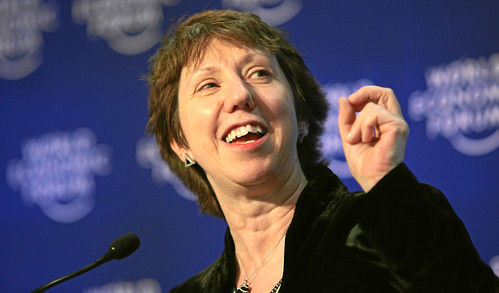by David Steven | Apr 30, 2010 | Europe and Central Asia

And for the EU’s latest foreign policy disaster (and one that reflects enormously badly on Gordon Brown if the story is true), the Telegraph claims that Baroness Ashton is on the brink of resigning after only months in her job:
“Every day is an uphill struggle,” said a European Commission official. “No one predicts she can stay five years, not even she.”
Lady Ashton has come under fire from powerful countries led by France, for allowing the Commission to seize too much control of a new EU diplomatic service that she is building from scratch.
Her lack of political authority has been blamed for a failure to stamp out bureaucratic Brussels in-fighting over who will control the new European External Action Service, with 7,000 diplomats manning over 130 embassies around the world.
Bitter turf wars over budgets and senior posts mean the diplomatic corps will be delayed, a situation that has angered governments and embarrassed the EU on the global stage.
Following one recent row, she allegedly threatened to walk out of her job and had to be talked out of resigning on the spot by diplomats and officials.
Of course, this may be wishful thinking by the Telegraph, but it’s another shocking misstep if true…
Update: And the plot thickens. According to the Daily Mail, Peter Mandelson is floating the resignation rumours because he expects to be Foreign Secretary and needs to find a job for David Miliband.
An Ashton aide told the MailOnline the report had ‘Mandelson’s fingerprints all over it.’ Mandelson wants to force Ashton to resign and hand over the EU job to David Miliband, the source said.
Miliband, the Foreign Secretary, was offered Ashton’s job last year but refused it, reportedly because he didn’t want to spend ‘years on a plane’.
But does Mandelson really expect Labour to form the next government? And how could he push Ashton out between now and Gordon Brown naming his cabinet after the election?
by Michael Harvey | Dec 18, 2009 | Conflict and security, Economics and development, Europe and Central Asia, North America
– With the US and Russia reportedly close to agreeing a successor START deal, Gareth Evans and Yoriko Kawaguchi chart the next steps for a secure nuclear future. Details of their recently published report on nuclear non-proliferation and disarmament can be found here. Henry Kissinger, meanwhile highlights the importance of kick-starting progress on six-party talks with North Korea.
– Elsewhere, Nouriel Roubini reflects on “gold bubbles” and the need to beware the calls of “gold bugs”, given that the “recent rise in gold prices is only partially justified by fundamentals”. The FT’s Alphaville blog offers an alternate view.
– Catherine Ashton, the EU’s High Representative for Foreign Affairs and Security Policy, outlines her vision of a “quiet diplomacy” keenly focused on “getting results”. The BBC’s Europe Editor, Gavin Hewitt, assesses the upcoming challenges she is likely to face – whether a winter energy crisis, shaping a coherent EU policy towards the Middle East, or establishing the much-trumpeted EU diplomatic service. Charlemagne, meanwhile, argues that when it comes to European foreign policy there are simply “too many cooks”. Philip H. Gordon, US Assistant Secretary of State for European and Eurasian Affairs, offers his thoughts on what the post-Lisbon landscape is likely to mean for US-EU relations.
– Finally, Prospect presents 25 key public intellectuals that have helped us navigate the squalls of the financial crisis – Simon Johnson, Avinash Persaud, and Adair Turner make up the top 3. Niall Ferguson, meanwhile, offers his take on the most influential thinkers of the past now showing renewed relevance – Keynes, Polanyi, Kindleberger and Darwin, among others, have places on his list.
by Michael Harvey | Nov 20, 2009 | Conflict and security, Europe and Central Asia, Influence and networks, North America
– With the new EU President and High Representative finally decided, the FT wonders whether current Commission President, José Manuel Barroso, is the true victor from all the horse-trading. The Times has news that, consistent with the Lisbon reforms, the EU is attempting to strengthen its presence at the UN. Sunder Katwala, meanwhile, suggests that European member states still lack a fundamental sense of what they want to achieve as one in the global arena.
– As President Obama continues to review Afghan strategy, the WSJ assesses the impact on US-UK relations. Con Coughlin, meanwhile, paints a more pessimistic picture of the “exclusivity of [Obama’s] style of decision-making”.
– Elsewhere, Fyodor Lukyanov heralds Mikhail Gorbachev’s idealism, suggesting he was “the last Wilsonian of the 20th century”. Richard Haass, meanwhile, explains how lessons drawn from the Cold War could help address contemporary global challenges.
– Finally, World Politics Review has a series of articles on modernising the US State Department and creating a more integrated national security architecture. The Guardian, meanwhile, surveys the UK Foreign Office’s growing “brave new world of blogger ambassadors”.

